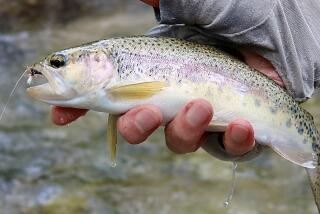Transit Planners Dredge Up Idea of Riverbed Freeway
Los Angeles County transportation planners have resurrected the idea of building a freeway on the bed of the Los Angeles River and possibly other flood control channels to alleviate traffic congestion, officials said Tuesday.
A six-month, $100,000 study is under way to examine how soon the riverbed, which is dry most of the year, could be used as an alternative commuter route, said Assemblyman Richard Katz (D-Panorama City).
“The idea has been around for a long time,” said Vic Kamhi, an analyst for the county Transportation Commission. “During World War II, truck convoys used the riverbed to get to the harbor from Pasadena.
“It’s been studied periodically over the years. What we’re doing now is trying to determine what’s been done in the past and what are some of the barriers of making use of flood control channels.”
Hiring Consultant
Kamhi said the Transportation Commission is in the process of hiring a consultant and is “hoping to have a very quick and very preliminary study done in a couple of months.”
The Los Angeles River, he said, is one of several flood control channels under consideration, but its access to the populous San Fernando Valley has made it especially appealing.
Katz said he is optimistic that the riverbed freeway could be serving commuters in two years.
“I hope to be able to use it by 1991, but we must wait for the results of the study as far as feasibility, potential ridership and environmental concerns,” Katz said.
“As a less expensive answer to congestion, the riverbed should not be ignored,” he said. “It just makes sense to look at it. It’s just too good to pass up.
Katz foresees a two-lane road that would be limited to high-occupancy vehicles, such as vans, car pools and buses. The roadway could begin at the west end of the river, just east of Topanga Canyon Boulevard at Vanowen Street, he said.
Access points could be constructed before the San Diego Freeway, at the freeway and somewhere near Griffith Park before ending at the Pasadena Freeway, he said.
Potential Capacity
“Those two lanes would have the potential capacity of seven regular freeway lanes” because of the high-occupancy requirement, Katz said.
The proposal faces several obstacles, including how to protect motorists in the event of a rare flash flood and paving costs, which county officials said would be “substantial.” Officials will also have to decide what to do with treated sewage that flows down the river.
One solution, Katz said, might be to make the river a fair weather freeway.
The river’s main purpose is flood control, but Kamhi said it is “relatively dry” 300 days of the year. Other analysts say it would be usable 200 days a year.
Another possible roadblock is Mayor Tom Bradley’s support for a “greening” of the concrete-lined river to return it to some semblance of the spring-fed brook it once was with trees, shrubbery and open areas along its banks.
Bradley’s press secretary, Bill Chandler, said that the mayor has not seen details of the freeway proposal and could not comment on it, but that the greening program remains a priority.
“We also have to consider the channel’s access to roads and the adjoining residential uses,” said Kamhi, adding that the commission may ultimately decide the obstacles are insurmountable.
More to Read
Sign up for Essential California
The most important California stories and recommendations in your inbox every morning.
You may occasionally receive promotional content from the Los Angeles Times.










